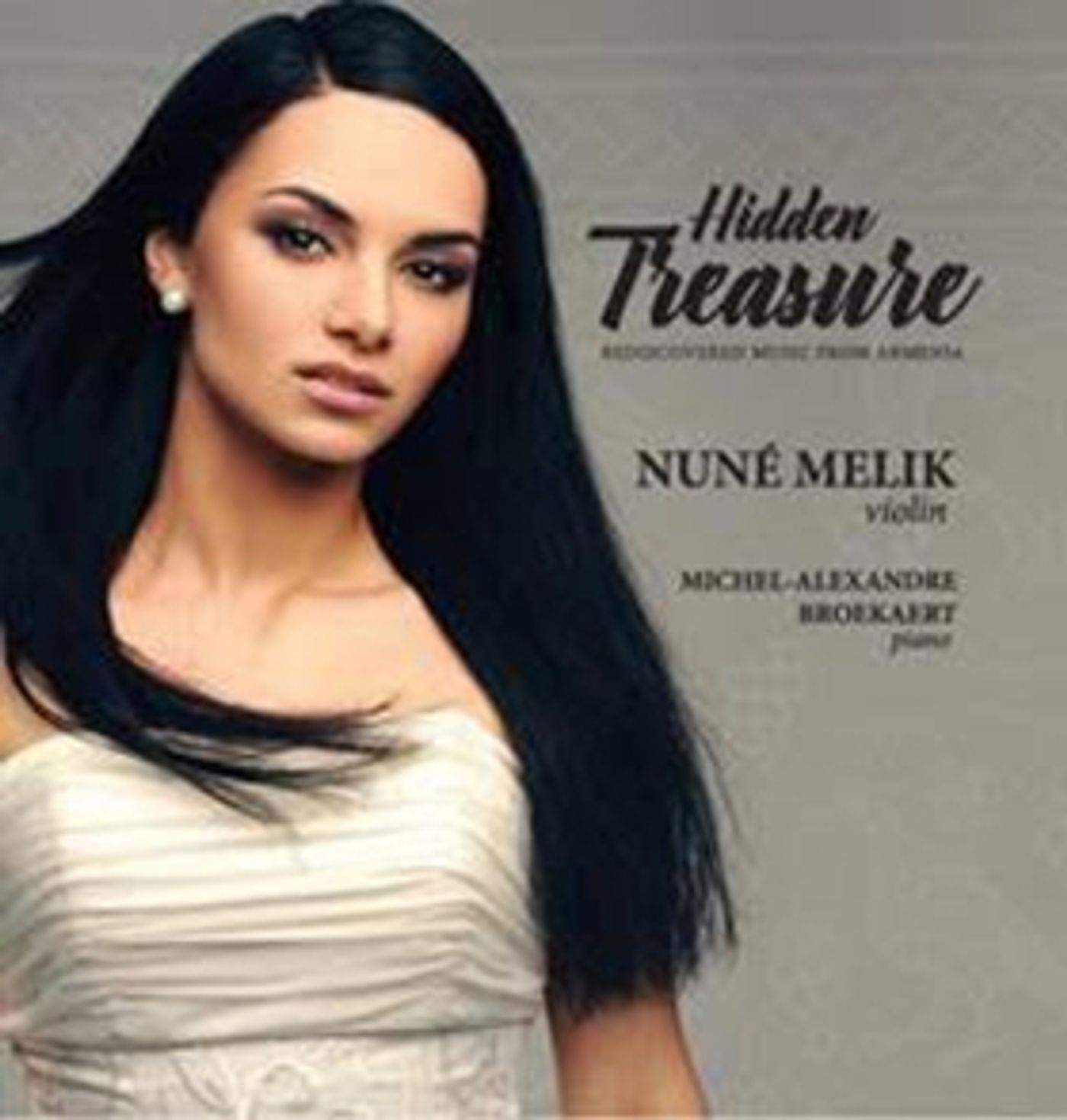Violinist Nuné Melik Makes Recording Debut With HIDDEN TREASURE

When violinist Nuné Melik moved from Moscow to Montreal alone in 2009 she felt déracinée, or rootless. To combat her loneliness, the Siberian-born violinist of Armenian and Georgian heritage began to play music from composers she had heard and loved growing up. Soon, Melik became inspired to dig more deeply into the music of her homeland, igniting a passion for research - including three trips to Armenia over the past seven years - and the desire to bring this music to a wider audience. Since forming a partnership with pianist Michel-Alexandre Broekaert in 2010, Melik has performed the music of Hidden Treasure to audiences across North America and beyond, and has also delivered numerous lectures, in four languages, about her research. Melik calls this very personal album "a celebration of the survival spirit and creativity of the Armenian people."
Some of the music of Hidden Treasure, with its idiomatic folk melodies and themes, was composed under the shadow of the Armenian Genocide of 1915, a humanitarian tragedy with more than 1.5 million casualties. Among this music are works by Komitas Vardapet (1869-1935), considered to be a founder of Armenian classical music. In his sorrowful "Apricot Tree," as arranged for violin and piano, the singer entreats the tree not to bear fruit because his grief is so deep. The composer's "Krunk" (Crane), in which a crane is asked for news from the motherland left behind, became the symbol of a nation's exile. In contrast, in Vardapet's more lyrical "Keler Tsoler" (Striding, Beaming), arranged for violin and piano, a woman tenderly addresses her lover.
More commonly-known outside of Armenia is the music of Aram Khachaturian (1903-1978), the first composer who successfully combined Caucasian folk music and European traditional music. Khachaturian's masterful "Song-Poem after Ashugs" refers to the country's street musician-poets. And, from the same ballet score as the composer's trademark "Sabre Dance" comes his "Nuné's Variation," dedicated to his daughter. The arrangement for violin and piano expresses all the virtuosic energy and whimsical humor of the original.
An enourmously successful virtuoso pianist, Arno Babadjanian's (1921-1983) eccentric musical style and charismatic personality is in evidence in his three-movement Sonata for Violin and Piano of 1959, deemed a "masterpiece" by his close friend Dimitri Shostakovich. In the composer's "Elegy," he transforms a simple ashug melody into a virtuosic classical work for piano. Alexander Spendiarian (1871-1928) is one of the most influential composers in Armenian classical music. His "Khaidarma," a reminiscence of composer's childhood, is a Crimean-Tartar dance which became a part of the symphonic cycle Yerevan Etudes/Crimea Sketches in 1903.
A violinist who "has proven the theory of self-actualization" (Strings Magazine), Nuné Melik made her debut at Carnegie Hall's Stern Auditorium in September 2016, which was followed by an invitation to perform at the United Nations. Melik has appeared as a soloist with Sinfonia Toronto, Senior Orchestra of New York, Gnessin Virtuosi, the Moscow State Chamber Orchestra, and the Miami Chamber Orchestra, where she is Artist-in-Residence. She was winner of the Waldo Mayo Competition for 2016 and has also earned prizes at the Andrea Postacchini Competition (Italy) and the I Oistrakh International Competition (Russia). A multi-talented artist, Melik has published anthologies of Russian poetry, which have been translated into Armenian, French, and now English. She recently starred in the award-winning short film "Where is Music" about the music of Armenia. Melik studied at the Moscow State Conservatory and holds a Master's degree from the University of Montreal where she was the program's youngest graduate, at age 20. She is currently a Doctoral candidate at the Schulich School of Music at McGill University, studying with Andrew Wan.
Opera magazine says of Michel-Alexandre Broekaert, "He demonstrates both excellent listening ... and a remarkable touch. Under his fingers, the music breathes and blossoms." A pianist and coach at the University of Montreal and McGill University, Broekaert completed his doctorate under the tutelage of Jean Saulnier, followed by studies in Vienna with Avedis Kouyoumdjian.
Friday, December 1 at 7:00 pm
Hidden Treasure - New York album launch
Tenri Cultural Institute (43A West 13th Street)
Tickets $20 at Eventbrite
Videos
